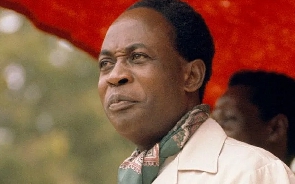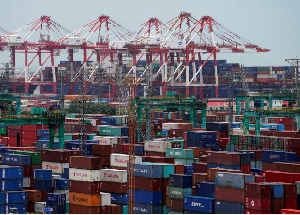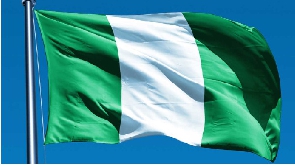- Home - News
- TWI News | TV
- Polls
- Year In Review
- News Archive
- Crime & Punishment
- Politics
- Regional
- Editorial
- Health
- Ghanaians Abroad
- Tabloid
- Africa
- Religion
- Election 2020
- Coronavirus
- News Videos | TV
- Photo Archives
- News Headlines
- Press Release
General News of Tuesday, 21 May 2024
Source: www.ghanaweb.com
COCOBOD Scholarships: How another Nkrumah legacy has been flushed down the drain forever
Ghana as a country probably saw its best era of infrastructural and economic development under the country’s first president, the late Dr Kwame Nkrumah. The era of Kwame Nkrumah witnessed massive infrastructural projects, the establishment of companies, and audacious social intervention programmes, all aimed at making the country self-reliant.
It was during this era that infrastructural projects including the Akosombo Dam, the Tema Motorway and the Tema Town, the now Accra Technical University, the University of Cape Coast, and the now Komfo Anokye Teaching Hospital were undertaken; as well as the establishment of factories like the Kumasi Jute Factory, the Kumasi Shoe Factory, Ghana Industrial Holding Corporation (GIHOC), the Bolgatanga Meat Processing Factory, and the Asutsuare Sugar Factory.
However, much of the legacies of Ghana’s first president are being eroded. Most of the factories he established, including the Kumasi Pencil Factory, the Bonsa Tyre Factory, and the Wenchi Tomato Factory, have been left to rot, with some of his social intervention policies cancelled.
The latest legacy of the former president that will no longer exist is the popular Cocoa Marketing Board Scholarship scheme, following the announcement by the leadership of the Ghana Cocoa Board (COCOBOD) that the scholarship has been cancelled because it has "lost its core purpose due to the Free Senior High School Programme (Free SHS)."
Why Nkrumah established the COCOBOD scholarships:
Historian Yaw Anokye Frimpong, in an interview with journalist Kafui Dey, gave the history behind the establishment of the Cocoa Marketing Board Scholarship, which is popularly called the COCOBOD scholarship.
He indicated that a disagreement between Ashanti chiefs and the late Dr. Nkrumah led to the establishment of the scholarship scheme.
According to him, the chiefs, led by the then Asantehene, were not pleased with Nkrumah using almost all of the proceeds from the country's sale of cocoa beans for development projects across the country, while giving cocoa farmers, who are mostly from the Ashanti Region, which included today's Ahafo Region, Bono Region, and metropolitan Ashanti, meagre sums.
He said that Ghana's first president then came up with the Cocoa Marketing Board Scholarships to appease the Asantehene and the Ashanti chiefs who were pressing him for a fair share of the cocoa proceeds.
"What they (the chiefs) wanted was that they were the producers of cocoa, and farmers (hired labourers) were being paid. Even though they came from the north and other parts of the country, like the Volta Region, they were being paid alright. Nobody was cheating them… and the little that the cocoa farmer (producers) would get at the end of the day, Kwame Nkrumah, 'you are telling us that you are using it to develop the country, including scholarships for the northern people, who have already been paid, and putting up schools everywhere. So, we believe that you have to rather split it'," Anokye Frimpong narrated.
After several visits by the chiefs, Nkrumah did not budge to their demands for an increase in their share of the country’s cocoa proceeds.
He said that Nkrumah told them that rather than giving them the increment directly, he would give scholarships to their children.
"And one of the reasons he gave them was that 'in place of putting money into the hands of the farmer, I have decided to create a Cocoa Marketing Board Scholarship for every parent whose ward will be able to produce evidence that his father is a cocoa farmer.
"The moment you show it to the headmaster, you will be given a CMB scholarship. And the reason why I'm doing this is that I know the farmers because my parents were farmers. And I see what farmers do the moment they get plenty of money; they marry more women, and they don't think about the education of their children. I want you to think about the education of your children.
"So, I am retaining the money that should have gone to you in order to educate your children for you so that when they grow up, you have people like me, you have lawyers, doctors, teachers, nurses, engineers, accountants, everything'," he detailed.
BAI/AE
Watch the latest Episode of Everyday People below:
Ghana’s leading digital news platform, GhanaWeb, in conjunction with the Korle-Bu Teaching Hospital, is embarking on an aggressive campaign which is geared towards ensuring that parliament passes comprehensive legislation to guide organ harvesting, organ donation, and organ transplantation in the country.











